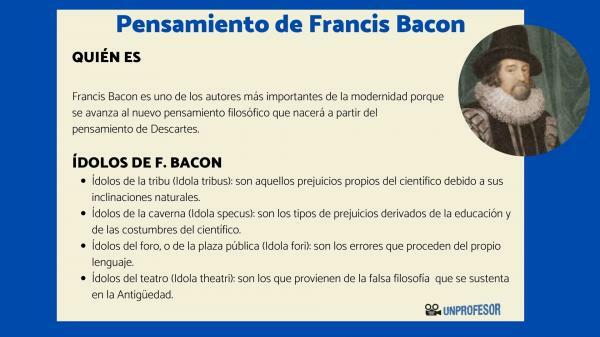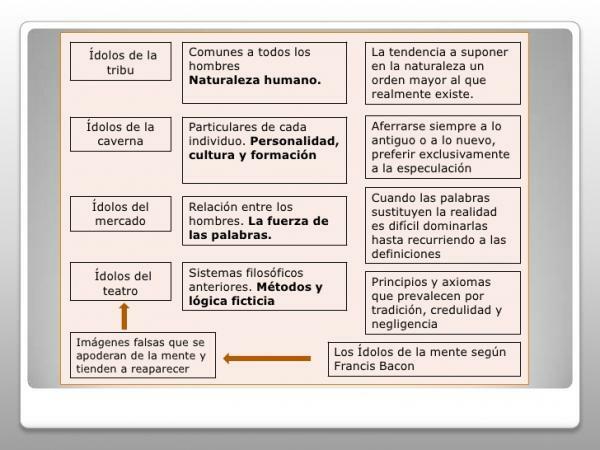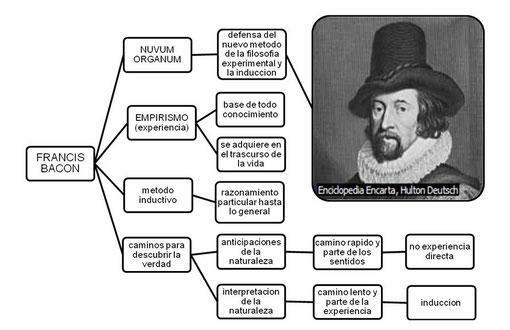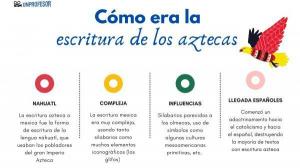Thought of Francis Bacon

In this lesson from a TEACHER we explain the thought of Francis Bacon, English philosopher, considered the father of empiricism philosophical and scientific. He is one of the most important thinkers of modernity, since he anticipates the scientific thought that is given from Descartes.
One of his most important works is his Novum organum(1620), in which he defines the rules of the experimental scientific method. Another of his great books is his De dignitate et augmentis scientiarum, or On the dignity and progress of the sciences (1620), where he develops his empirically-based theory of knowledge. The new Atlantis is a utopia that seeks a change in the Government system. But his greatest contribution is in the scientific field.
If you want to know more about the thought of Francis Bacon, keep reading this article that offers you a PROFESSOR.
Index
- Who is Francis Bacon
- Classification of idols or mistakes
- Novum organum, the fundamental work of Francis Bacon
- On the scientific method: the theory of the three tables
- Main works of Francis Bacon
Who is Francis Bacon.
Francis Bacon is one of the most important authors of modernity because he advances to the new philosophical thought that will be born from the thought of Descartes. Bacon is considered As the father of empiricism and one of his favorite subjects will be the Utopia, although his most important contribution is found in the field of science.
Bacon is clear that Aristotelian science no longer works, that is why science and its methodology have to be replaced.
Classification of idols or mistakes.
To better understand the basis of Francis Bacon's thought, we have to discover the classification of idols that the philosopher carried out. One of the fundamental elements that he establishes for science is to try to solve the typical errors, to which he names idols:
- Idols of the tribe (Idol tribes): are those prejudices of the scientist, due to his natural inclinations.
- Cave idolsIdol specus): are the types of prejudices derived from the education and customs of the scientist.
- Idols of the forum, or of the public square (Idol fori): are the errors that come from the language itself.
- Theater idolsIdol theatri): they are those that come from false philosophy, which is based on antiquity, in the old, in tradition. This is the worst of all prejudices and the one that Francis Bacon tries to destroy the most.
“If we have any humility towards the Creator; if we have any fear or esteem of his works; if we have any charity towards men or any desire to alleviate their miseries and needs; if we have love for natural truths; aversion to the dark, no desire to purify understanding, these idols must be destroyed, who have led experience in captivity, and childishly triumphed over the works of God; and now in condescend length, with due submission and veneration, to approach and read the volume of creation; to dwell in it for some time, and bringing to the work of a mind well purged of opinions, idols and false ideas, to converse familiarly in it ”.

Image: Slideshare
Novum organum, the seminal work of Francis Bacon.
Novum Organum or Indications regarding the interpretation of nature It is a work published in 1620 and in it, he offers his peculiar vision of scientific knowledge. Until that moment, science had been considered merely theoretical, but with Bacon it is beginning to be understood in its practical dimension. This knowledge, he assures, will give the human being total control over nature. "Knowledge is power," he claimed.
The aristotelian logic it no longer works. It is only valid for the rhetoric. What's more, you need to find a new method. Thus, your task will be to solve the errors of science. And these errors he calls idols. In fact, Organum it was the treatise on Aristotelian logic, hence the name of Bacon's work. Idols are obstacles, limitations of knowledge, prejudices that must be freed in order to advance.
To be able to dominate nature, the human being needs instruments, that is, experiments, from the information collected from the experience, through the senses. This is what is known as empiricism.
"The logic in use is more appropriate to preserve and perpetuate the errors that occur in vulgar notions than to discover the truth: so it is more harmful than useful."
On the scientific method: the theory of the three tables.
Furthermore, in his masterpiece, Bacon develops a whole discourse on the scientific method, from logical induction and shows how the empirical data have to be interpreted. To this end, he proposes the "theory of the three tables", which serves to discover the antecedents and the correlation between the phenomena.
- Presence table: in this first table the data of the presence of a phenomenon are collected. For example: the sun gives off heat.
- Absence table: the cases in which the phenomenon does not appear are shown. An example would be the following: the moon does not emanate heat.
- Grade table: From the observation of nature, the information related to the different degrees of intensity or variables is indicated.
According to Francis Bacon, no empirical conclusion should be drawn without first making these tables.

Image: Jimbdo
Main works of Francis Bacon.
Francis Bacon was a very prolific writer that touched on several themes: political, religious, philosophical, although his greatest contribution is in the scientific field. Here is a list of the main works of the English thinker so that, thus, you have just delved into the thought of Francis Bacon and his most outstanding contributions:
- The Great Establishment
- Novum Organum
- The advancement of science
- Valerius Terminus: from the interpretation of nature
- Life and death story
- The New Atlantis
- essays
- The wisdom of the ancients
- Male birth of time
- Meditationes sacrae
- Rheological tracts
- An advertisement touches a Holy War
- Bacon's Personal Views of War and Peace
In addition, he did translations of psalms into English verse and legal works.
If you want to read more articles similar to The thought of Francis Bacon, we recommend that you enter our category of Philosophy.
Bibliography
- Bacon, F. Novum Organum. Ed. Anna Ruggieri (eBook)
- Manzo, S. (2008). The political uses of the body: the two bodies of the king in the political philosophy of Francis Bacon. Kriterion: Journal of Philosophy, 49 (117), 177-199.



